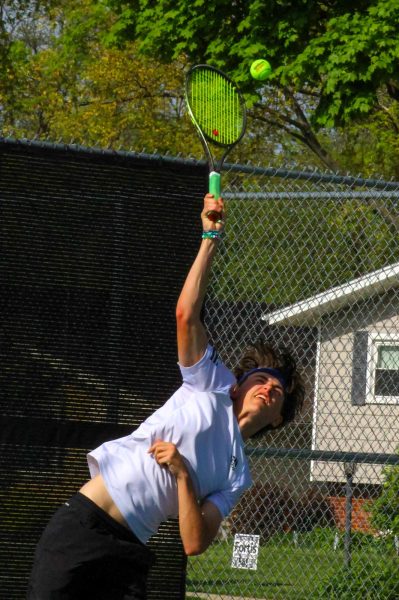REVISITING STAFF EDITORIAL REGARDING NO HOMEWORK WEEKENDS
February 11, 2021
This article originally ran in Issue #4 of The Prospector. We believe it is important to revisit this article as Prospect approaches another no homework weekend to remind teachers of the importance of these breaks from schoolwork. We are sad and frustrated to hear that—once again—many students are still being assigned work over the no homework weekend.
According to Associate Principal Iris Dominguez, Thanksgiving break this year was supposed to be a no homework weekend. However, according to a Prospector survey of 247 students, 42.9% of students had homework to complete over Thanksgiving break that was not make-up work.
Senior Naiya Rooks was one of these many students; she had math homework over the break as well as projects for some of her other classes. According to Rooks, Thanksgiving break left her just as stressed as she was before.
Rooks feels that she is receiving more homework this year because teachers are placing less value on classwork, so she often finds herself having to teach herself the material during homework assignments. Additionally, Rooks feels that the loss of a traditional senior year has contributed to her lack of motivation to learn and complete assignments.
“I feel like I’m just trying to get by … instead of trying to excel in my classes like I used to,” Rooks said. “I just want to be done with everything; I don’t have as much to look forward to.”
We, The Prospector, were disappointed to discover that almost half of students did not get to enjoy a homework-free Thanksgiving break. We acknowledge that teachers are trying to find ways to manage the loss of two hours of instruction per week, but assigning homework over a “no homework” weekend is unacceptable.
This is especially distasteful in the midst of a pandemic that has taken a serious toll on students’ mental health. It is time to stop simply talking about how much teachers care about students’ mental health; it is time that the school implements tangible changes.
In order to actively try to alleviate some of that stress, teachers must uphold promises — such as no homework breaks — to reduce some academic pressure. This means a break where a student can genuinely disconnect from their computers and iPads without being penalized or guilted for it.
Initially, the division heads sent out emails to the teachers to inform them of the no homework weekend. When Dominguez was approached with concerns from parents, she sent out an additional email to clarify to teachers what constituted this no homework break.
Dominguez added that a no homework break should include fair deadlines, meaning that a teacher cannot assign homework a week prior and have it due on the day students returned from break. Looking ahead to future no homework breaks, she said that she will make sure to be more explicit when reminding the teachers.
AP Psychology teacher Daria Schaffeld, a teacher who typically chooses to challenge her students, did not assign homework to her students over Thanksgiving break because she wanted to give them a chance to unplug from remote learning.
Schaffeld said that many people are experiencing a lack of control due to the pandemic, which is something that can bring heightened anxiety — especially for someone who was already struggling with mental illness beforehand.
To combat students’ lack of motivation, Schaffeld tries to be honest with her students and acknowledge that learning over Zoom is tough. She feels that it is very important to try to find the positive in every situation, even though she admits that it is not always easy to do.
Conversely, Rooks said that her teachers have been surprisingly strict with deadlines. However, she did say that they have been accommodating when she sent them an email individually.
“I’ve seen a lot less sympathy,” Rooks said. “… Teachers think that, because we’re at home, we just have infinite time [to complete homework]. In reality, it’s even harder to keep your mind on school when you haven’t left your house in weeks.”
Principal Greg Minter agrees that the pandemic has posed challenges for students and staff alike. He has had conversations with the teachers to encourage them to focus on only assigning the most essential work.
“Given that we’re not in the most ideal situations, we need to be empathetic and try to understand and give people the benefit of the doubt,” Minter said.
Furthermore, Minter said that AP teachers are feeling increased pressure to prepare students for the tests in May. As Schaffeld mentioned, they are losing two hours of instruction per week due to the block schedule.
Keeping all of these factors in mind, Schaffeld began working in June with a team of psychology teachers from around the country to determine which parts of the AP Psychology curriculum were the most essential. They did this by analyzing past free response questions and released AP exams to see which units they could move more quickly through.
“It’s actually really good teaching to always critically look at what you’re doing and why you’re doing it,” Schaffeld said. “Sometimes that happens very naturally as an educator, and sometimes you’re forced into it like we are right now.”
Furthermore, Minter feels that students may feel less overwhelmed if they took the extra two hours at the beginning of the school day to work on homework. He knows that this is not required of students, but it is time that they would have typically been spending in school.
Due to the fact that 72.7% of high school students do not get enough sleep on school nights, we do not feel that it is realistic for students to wake up at 8 a.m. to complete their school work. The later start of school days this year is beneficial to the student body as we know that teenagers’ minds work most efficiently at a later time in the morning.
Minter encourages students to communicate with their teachers individually if they are struggling or need additional help with a subject.
“I really do think most teachers will try to help or to figure out a plan if they know [that a student is struggling],” Minter said. “A lot of times, they just assume everything’s fine if no one is saying anything.”
A student can reach out to a teacher to ask for an extension or for them to re-open the dropbox on Schoology, but this does not solve the issue at hand. The stress of falling behind only adds more stress to the student because they cannot keep up with a copious amount of homework.
Rooks’ experience with feeling a lack of motivation is not an isolated one in our student body. It is true that students may have more time to complete work, but we should not forget why that time is there. It is the result of sports games being taken away, competitions getting cancelled, not being able to see friends or family and so on.
For the sake of the student body, we ask that teachers’ words reflect their actions.





















































































